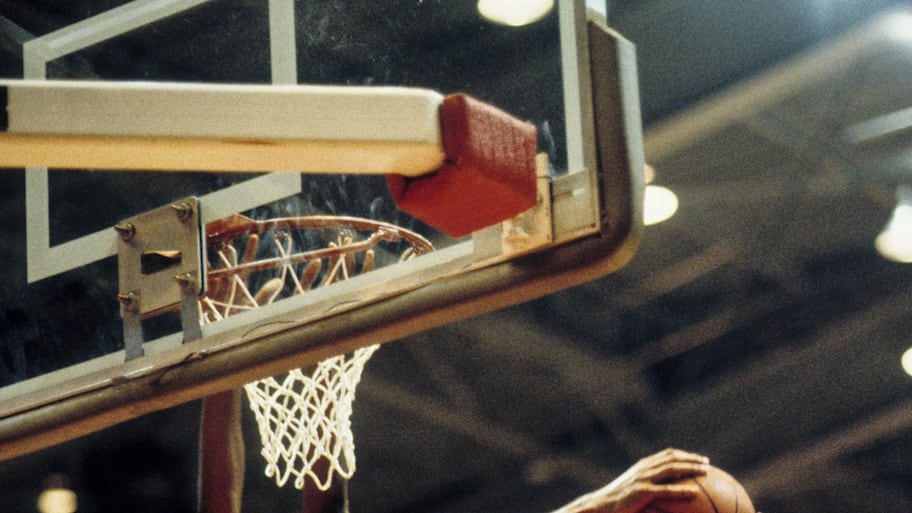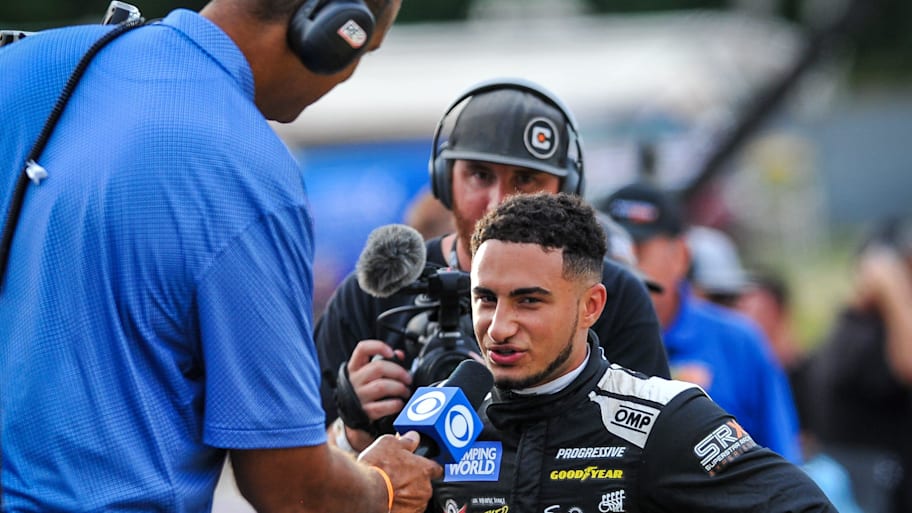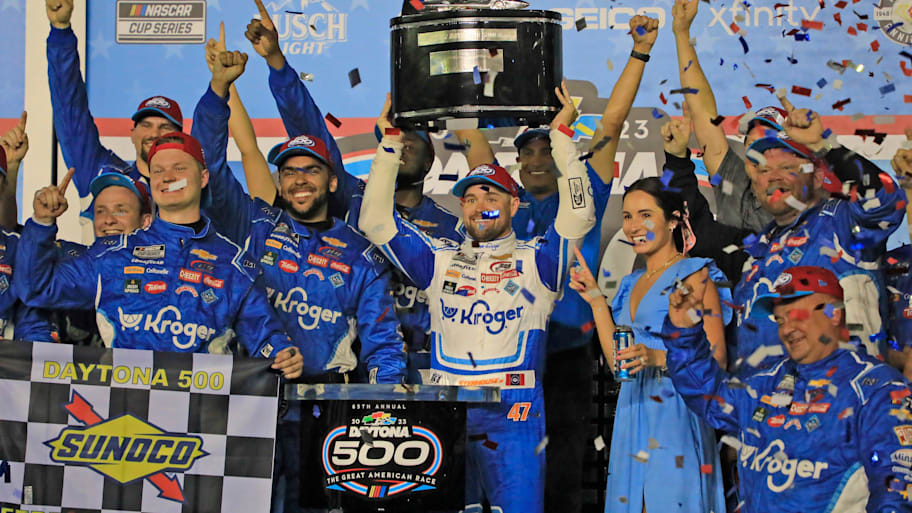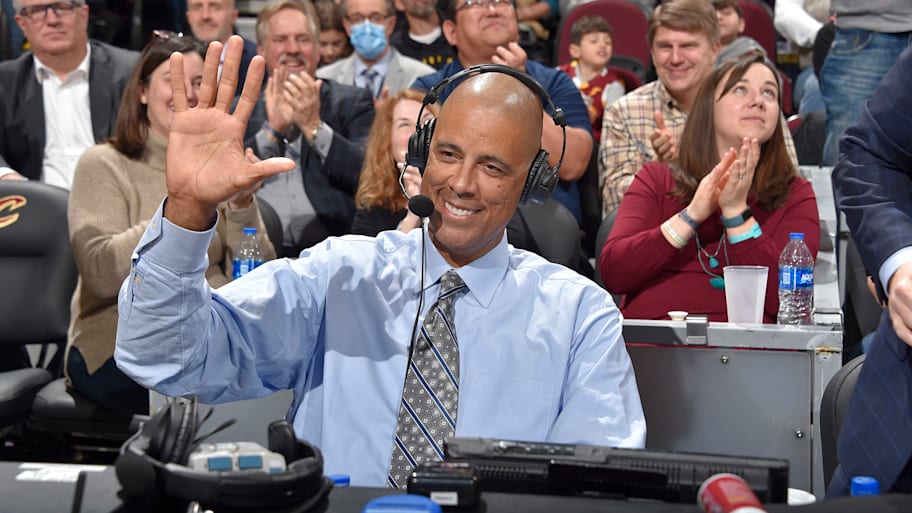Growing up in Black Mountain, N.C., Brad Daugherty was always devoted to the Tar Heel State’s twin passions: college basketball and car racing. Growing up, he used to play basketball during the day, and then head over in the evening to his friend’s race shop, where he often worked past midnight. And he kept his hands in racing—enjoying it as an off-season pursuit—even during his NBA career with the Cavaliers. Talking to the seven-footer today, it’s hard to tell if he was more excited to be the No. 1 pick in the 1986 draft or to win the Daytona 500 as an owner in 2023. Not only is Daugherty a co-owner of Hyak Motorsports, but he is also an analyst for both NBA and NASCAR broadcasts on NBC. Old habits die hard.
It’s hardly a surprise that when Michael Jordan—his teammate at UNC—was thinking about becoming an owner of a NASCAR team, one of the calls he made was to Daugherty, whose car is driven in the Cup series by Ricky Stenhouse Jr. Jordan eventually teamed up with current Cup driver Denny Hamlin to form 23XI Racing, whose colors are carried in the Cup series by drivers Bubba Wallace and Tyler Reddick. More than 30 years after Daugherty and Jordan battled it out on NBA hardwood, they are racing wheel-to-wheel in NASCAR.
Sports Illustrated recently caught up with Daugherty to not only talk about Jordan, but also about his life and career in racing.

SI: What was your Welcome to Racing moment?
Brad Daugherty: My welcome to racing moment was in 1989. I had partnered with my best buddy, Robert Pressley. He was a rookie racing in what’s now the Xfinity Series [but was then called the Busch Series]. We were racing late models; I worked on the cars and messed around and just had fun, and he drove, obviously. It was something I did in the off-season. I love cars. We had raced local-circuit stuff, and then we decided we were going to give the Busch Series a shot. We had built a race car, and had run a couple of races to try to qualify in. We did a pretty good job—didn’t run great, but ran okay.
And we were at Orange County Speedway in Rougemont, North Carolina. I can’t remember the exact date. [It was Aug. 12, 1989.] And we were there racing that weekend, and we were having a good thing, we were racing hard. I actually was the gas man on the race car. Thank goodness we didn’t have to fuel the car much back in those days—I think that’s why they gave me the job. But we were having a good race that evening. We were running quick, and I looked up with about 15 laps to go—and we were racing against Chuck Bown, who’s a champion, Tommy Ellis, who’s a champion, just all of these legendary guys—and we’re running fifth. And we get down to the white flag and Robert gets to third, and there’s a big scramble, they’re racing hard. And, lo and behold, we win the race. So that was kind of my Welcome to Racing moment because before that we were just messing around, having fun, going to local short tracks. Just guys having fun. I was like, Wow, this is a big deal. I think I want to do more of this.
SI: Growing up in Western North Carolina, in Black Mountain, was your family more about racing or were they more about basketball?
BD: You know, growing up in North Carolina, it’s kind of like college basketball and racing were almost our state bird. It was just everywhere. Our local newspaper was filled with the legendary stories weekly about Jack Ingram and Bob Pressley and Harry Gant going nose-to-nose over at Asheville Speedway. And then you turn around and read about Norm Sloan’s Wolfpack basketball team, and Dean Smith at Carolina. Both of those sports were such a huge piece of the cultural fabric of the state of North Carolina, and still are today. It's still woven deeply into it. My dad loved racing. My uncles were drag racers. We lived on a little family farm there in Black Mountain. And there was an apple tree that always had a chain and a winch hung over it with a motor hanging off of it, that type of thing. It was just normal. I know when people started seeing me at their racetrack—you know, a big basketball player, an African-American guy—it was like, “You like to race?” But I grew up going to Bristol and Shadyside and watching races, going to watch stock car races at Ashville Speedway, going to Darlington, going to Daytona. I just was always around it.
But I played basketball. I played baseball, too, and I played a little bit of football. We just were really a sports-heavy family, and racing was part of that appetite. So, Friday nights the big race for us would be over at Asheville Speedway. And then Saturday night they raced at Hickory or Greenville. And when we weren’t doing that we were playing basketball or playing pickup football or baseball or, you know, we were just hunting or fishing.
SI: When did basketball become your focus more than racing?
BD: It started in high school. You know, the racing thing was not going to happen. There were a bunch of things. First of all, if you look at me, I have no business trying to—racing for a living was probably not going to work out at 6'10", 6'11". It just wasn't going to happen. And just financially, there was no way. My family comes from humble means and trying to be in the racing business in any capacity other than working on race cars.... I wasn’t going to work on race cars for a living. I just did it to have fun because I love cars.
The basketball thing, it got me thinking, I’m pretty good at this. I enjoy it. I’m kind of a lone-wolf-type personality. I enjoy being by myself. I could go shoot basketball for hours. And there were a couple of basketball courts within a quarter mile of my house, so I went to one of them about every day, and I could shoot all day long and pretend I was David Thompson. And then when I got to high school I realized that this would be a great way to go to college for free. So, that was my first thought. And then I got better and, lo and behold, by the time I was a senior in high school I had 5-to-600 college scholarship opportunities.

SI: You got to North Carolina when you were 16 because you skipped eighth grade?
BD: I’d actually just started school early. My birthday is in October. So, looking back on it, I think my parents were sick and tired of me being around the house. I went to kindergarten early, about a year and a half early. I ended up at Chapel Hill at 16, and then turned 17 that October.
SI: Did you used to talk about racing with Michael Jordan?
BD: No. You know, Michael, his affinity for racing kind of grew. I think it became much deeper after he was in college. Every once in a while we talked a little bit about racing, but not a whole lot. There was so much going on. I mean, we were in Chapel Hill. We were chasing basketball and girls, you know? It kind of wasn’t one of those things you just talked about. We were college kids. We were talking about our geology classes—what a pain in the butt they were, how hard they were, and that type of thing. We didn’t talk about racing. We talked about, obviously, trying to win basketball games, and also just the normal things that guys talked about back in the ’80s in college.
SI: I assume it’s hard to focus on anything but basketball when you’re at Carolina and then you’re the No. 1 pick in the NBA draft?
BD: Yeah, but racing was always in the summertime. So, you know, we messed around with race cars usually in June and July. That's when the little, local short-track stuff would kick up. They’d start racing a little bit before that, but when it got hot and heavy I’d usually hook up and go race with Robert Pressley. By June we’d have finished up our exams. I was usually done with school in the middle of May, and then I’d go work out every day, work on my basketball, and then go play with race cars. And that’s what Robert worked on all day. And I would meet him at night at the race shop, and we would work on a race car from basically six o'clock until midnight. And then on the weekend we’d go race.
SI: When did you meet Robert Pressley?
BD: I didn’t meet Robert until right after my senior year of college. His dad was a legendary short-track racer—won over 500 short-track races. My rookie year in the NBA, I befriended Robert at a race at Asheville. I was there with my buddies. We had a couple of guys who raced that were in our hometown, just local guys, and me and my high school buddies, we kind of helped those guys a little bit. We were always working on race cars and messing around. But we were at a race at Asheville, and after the race—[Robert had] won the race—I was walking down pit road, and there was Robert all by himself. So I walked over there and started talking to him. I was like, “You look like you need some help.” He started laughing. He said, “Yeah, I’ll take all the help I can get.” I said, “I don’t know much, but I love racing. I’ll work on your race car.” He told me to come on out to his shop. The next day, I loaded up and went out. And from then on, that’s where I was every day until I went to play basketball.
SI: Him driving and you working on the late models, right?
BD: Yeah, we were running late models for a couple of years, and we won track championships at Ashville, Greenville, Hickory. We drug that late model all over the country during the summer. We raced everywhere from Pulaski, Virginia, to Daytona—just all over. Robert was a talented driver. He was pretty rough, but he was definitely talented. We won a Mid-Atlantic regional championship one year—my math might be wrong, but we won like 18 out of 25 races or something crazy. Maybe 18 out of 30 races, something like that. That was probably around ’86 or ’87. So, I may have been a rookie in the NBA.
SI: When did you make the jump to Cup racing?
BD: Myself, Tad Geschickter and [his wife] Jodi Geschickter, that was JTG Racing. We raced together [beginning in 2008] for well over a decade. We ran bunch of races together. We won the Daytona 500 in 2023 with Ricky Stenhouse Jr. Now my partner’s Gordon Smith. Our company is called Hyak, which is Chinook for go fast. And, you know, we’re just beating right along, trying to build our program and continue to race as a single-car team. Small guys—got a small operation—but man, we race hard and we love racing.

SI: Did Jordan seek you out for advice before he became a NASCAR owner?
BD: Yeah, I talked to Michael. He was just so passionate about getting involved. He’s great friends with Denny [Hamlin], and Denny kind of coaxed him into it. I think Michael was really comfortable with just being a fan and enjoying it. I think Denny—you know, they play a lot of golf together and they’re good buddies, and I think Denny showed him what it could be, especially with Toyota.
And Michael, he called me and said, “I’m at the end of my career with basketball and being an owner, and I want to get into the racing business in a big way. And so, we talked about the business and how it works. I told him, “I’m a little fish, and this is how I make it work. My aspirations are to be successful. I don’t want to be big. But now, for you, you’re going to have different opportunities, different resources, because you’re a cultural icon. Everybody’s going to want a piece of that. Every manufacturer’s going to try to figure out a way to be getting into the Michael Jordan business.” I just told him, “It’s going to come at you like water out of a fire hose. So be prepared and, you know, have fun with it.”
And he loves it. He loves his racing, man. And he loves all forms of racing. He owned a Superbike team. People don’t realize that. He was heavily into motorcycles and motorcycle macing. That was his passion. A lot of people don’t know that. And he just loves racing, so it’s fun, man. I’m looking at Bubble Wallace over these last several weeks, and I think he’s developed himself into a driver that on any given weekend is going to win a race—for the rest of his career. And Michael’s got to be exceedingly proud about that. I know he is. He gave Bubba a hell of an opportunity.
I had a chance at Bubba: I talked to him when he was exiting Roush, and I talked to my partner, Tad [Geschickter], about trying to get Bubba in a race car for us. And I just hated it that we couldn’t do it. I talked to Bubba about it. It would have been kind of a disservice to him, because my race team, we have to scrap—kind of like the race teams he went and drove for before he got to Michael. And I wanted Bubba to have the same opportunities that his peers had. His peer group got into the premium rides. They went through Hendrick and Penske, and he hadn’t had that opportunity. And so, when it didn’t work out for him to get in our race car—which would have been just a lateral move for him anyway—I was so tickled. I told Michael, “Man, thank you. I’m so proud of you, and I’m so happy. It makes my heart warm that [Bubba’s] going to have a real opportunity to showcase his talent and his ability.” And now he’s showing it.
SI: Was winning the Daytona 500 a career achievement for you?
BD: Yeah, it’s the pinnacle of the sport. As a little kid I was watching it on ABC, watching the Allisons trying to whoop Cale Yarborough’s behind on national TV! And my uncle, Booker Mitchell, used to take me to Daytona as a kid. We’d drive all the way to Florida and watch those races. You know? I’m thinking back. My dad was—oh, man—we used to have this big car. It was so fun. My dad, we’d get in the car and take off and, you know, that was back in the late ’70s or whatever. And you think of today how much the world has evolved. We’d get in the car, my dad’s yelling at everybody, rolling the windows up. He’s smoking. He’s chain-smoking and we’ve got the windows rolled up and we’re driving down the interstate! He’s like, “Put those damn seatbelts down between the seats before they hit somebody and somebody gets hurt!” You know? It was just so different than it is today.
Being a small team, winning the Daytona 500, that’s as good as it gets. We’re never going to win a championship. We’re not going to out-resource those big teams. They got all the resources of the manufacturers lined up behind them to win those championships. But if you can win races, you win at Talladega, you win at Daytona—you know, we’re really good at concrete places, our little race team. We could have a perfect day. We could win Dover, we could win Bristol, maybe somewhere like Nashville or Atlanta, where we think we’ve got a chance. That’s what it’s about. The family atmosphere of our race team and just us against them.
And yeah, we get our teeth kicked in a lot. But man, we go at it and we love it. And it’s fun. The pursuit is fun. Then when you get to something like the Daytona 500, that Harley J. Earl Trophy, it’s like looking at a diamond. You know? And we have one.
This article was originally published on www.si.com as Brad Daugherty Bridges Two Worlds with His Balancing Act Between NASCAR and Basketball.
